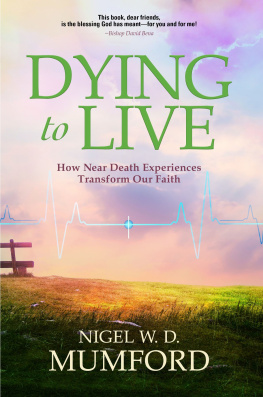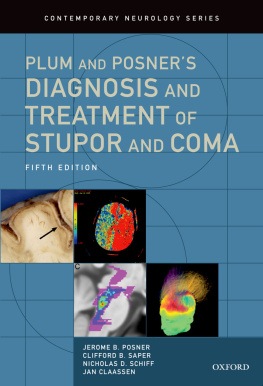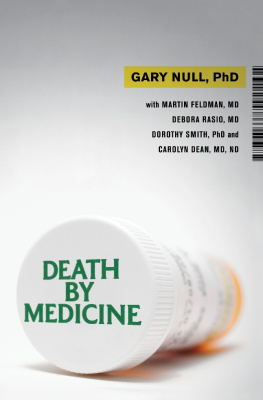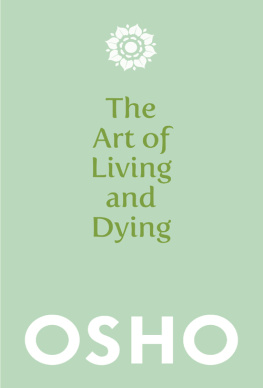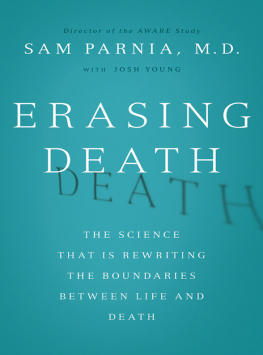Death before Dying
Death before Dying
GARY S. BELKIN
NEW YORK UNIVERSITY SCHOOL OF MEDICINE NEW YORK, NY


Oxford University Press is a department of the University of Oxford.
It furthers the Universitys objective of excellence in research, scholarship,
and education by publishing worldwide.
Oxford New York
Auckland Cape Town Dar es Salaam Hong Kong Karachi
Kuala Lumpur Madrid Melbourne Mexico City Nairobi
New Delhi Shanghai Taipei Toronto
With offices in
Argentina Austria Brazil Chile Czech Republic France Greece
Guatemala Hungary Italy Japan Poland Portugal Singapore
South Korea Switzerland Thailand Turkey Ukraine Vietnam
Oxford is a registered trademark of Oxford University Press
in the UK and certain other countries.
Published in the United States of America by
Oxford University Press
198 Madison Avenue, New York, NY 10016
Oxford University Press 2014
All rights reserved. No part of this publication may be reproduced, stored in a
retrieval system, or transmitted, in any form or by any means, without the prior
permission in writing of Oxford University Press, or as expressly permitted by law,
by license, or under terms agreed with the appropriate reproduction rights organization.
Inquiries concerning reproduction outside the scope of the above should be sent to the
Rights Department, Oxford University Press, at the address above.
You must not circulate this work in any other form
and you must impose this same condition on any acquirer.
Library of Congress Cataloging-in-Publication Data
Belkin, Gary S. (Gary Stuart), 1962 author.
[Death before dying (Oxford University Press)]
Death before dying / Gary Belkin.
p.; cm.
Includes bibliographical references.
ISBN 9780199898176 (alk. paper)
I. Title.
[DNLM: 1. Brain Death. 2. Bioethical Issues. 3. Consciousness. W820]
RA427.25
174.2dc23
2013033106
9 8 7 6 5 4 3 2 1
Printed in the United States of America
on acid-free paper
To all of those whose lives have been interrupted by hard medical decisions
CONTENTS
This book would not have happened without a confluence of generous circumstances and generous people who let me translate a personal passion for history into a PhD and subsequent deep dive into this subject. While in training as a resident in psychiatry at Massachusetts General Hospital (MGH) in the early 1990s, I was three subway stops away from the Harvard University Department of the History of Science. MGH (in the form of John Herman) and Harvard (personified in a troika of cherished mentors: Everett Mendelsohn, Barbara Rosenkrantz, and Allan Brandt) made it possible to leverage that proximity along with small patches of flexible time into a workable pathway toward completing the requisite coursework. It was during this time that I started to gather some of the material presented here, revisiting it all well over a decade later at the urging of my wife, Kate, who thought that perhaps some better use could be made of this research than as the basis for random intrusions into dinner conversations. She turned out (as usual) to be right. For her encouragement and for many other, even better reasons, I am grateful for every day that she is in my life.
Thoughtful readings of the whole or parts of versions of the manuscript from Daniel Callahan, Barron Lerner, David Millett, and Eelco Wijdicks were very much appreciated, as was the belief, from Craig Panner at Oxford University Press that this was worth doing, even through my shameless moving of deadlines.
It has been some time since I put them to work, but I am eternally grateful to the staff at the MGH Medical Records Department who repeatedly came through for me and who were remarkably adventurous in tracking down, from remote storage, records from the 1950s and 1960s. I am deeply grateful for the opportunity to have met Robert Schwabs long-time collaborator Mary Brazier, and his widow Joan Schwab, both of whom shared valuable recollections as well as otherwise unobtainable papers of Robert Schwab. The recollections of other formative participants or witnesses to many of the events described here also include Raymond Adams, C. Miller Fisher, Edward Lowenstein, Vincent Perlo, Henning Pontoppidan, Joseph Murray, William Sweet, and Robert Young. Many of their specific comments are dutifully referenced in these pages but their time to share an overall sense of working at MGH during this period was much appreciated for thinking about the themes that formed this book. My gratitude also goes to Jessica Murphy at the Center for the History of Medicine at the Countway Library of Medicine, who was wonderfully flexible in making materials there available, and to Fred Plum for his insights on what we can know about coma. Thanks as well to Keith Chiappa who miraculously uncovered hidden cabinets of old microfilmed EEG recordings at MGH, and Anne Harrington for one of those tipping-point seed grants that got me the person-hours of help I needed to sift through over ten thousand tracings on those microfilms. I was also privileged to train under Ned Cassem, who brought me onto the MGH Optimum Care Committee he created thirty years earlier; this is where I first took on the task of diagnosing brain death and of trying to make sense of difficult end-of-life and other care decisions with patients, families, and caregivers.
The contribution of a few neighborhood cafs, and their passion for making espresso a true craft, should not be underestimated and provided me with invaluable workspace (and attention enhancement) over several years. Thank you Jonathan Rubinstein (Joe!), Sam Penix (Everyman!), and the whole crew at Stumptown. Thanks to Kirafor looking over this earlier on and being honest that it needed a do over; to Lisafor showing me so skillfully that Belkins can write books; and to Mom and Alfor being proof that lifelong learning is the fountain of youth. Richard Jennis has helped keep me afloat for over three decades now, and Amanda Davidson helped me be clearer and get closer to rules of grammar and prose I otherwise tend to ignore.
Finally, Annie and Emma: I am not sure how much of my own romance with history will rub off on you. But the work of writing history would do well with no higher goal than to help move the world a bit closer toward the integrity and humanity you each already have. You are deeply loved.
I have pronounced many individuals dead, and, believe me, I am nervous and on edge when I do.
EDWIN H. ALBANO, New Jersey Medical Examiner, September, 1968
When all is said and done, it seems ironic that the end point of existence, which ought to be as clear and sharp as in a chemical titration, should so defy the power of words to describe it and the power of men to say with certainty, It is here.
EDITORIAL, JAMA, 1968
More and more, we are going to die when someone makes the decision that we are going to die.
The New York Times, February 2, 1997
M y first night as a doctor began with a request to declare a patient dead. Unexpectedly, a question came to mind: How do I know this person is dead? On the one hand, I was fairly confident that his heart was no longer beating, that he was no longer breathing, and that he was, dead. But when handed the task of formal declarationof officially and permanently drawing the line he had crossedI hesitated. Initially, that hesitation centered on deciding which method would best verify this apparent absence of pulse and breathing. I sought evidence of the slightest movement of heart and lungs as the magnitude of my pronouncement sunk in. How was I
Next page

